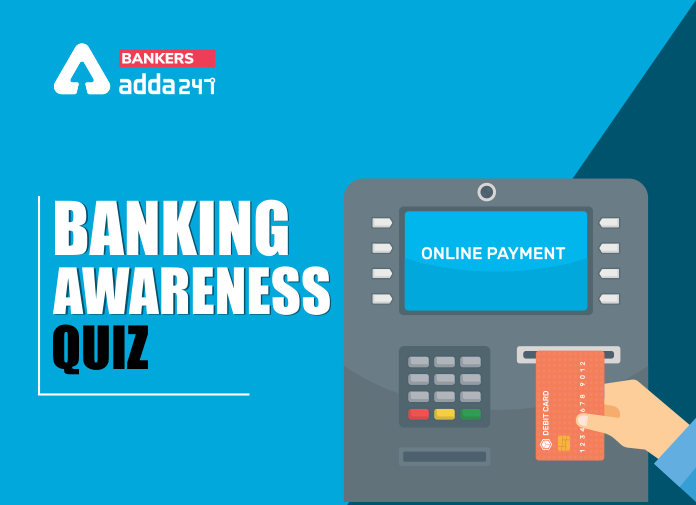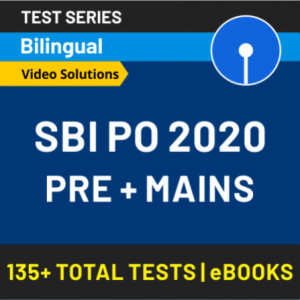Table of Contents
The Banking Awareness section constitutes a major part of a competitive examination and needs your undivided attention. With the increased competition in the field of Banking examinations, it has now become very important to cover up all the sections efficiently.
Banking Affairs 17th August 2020 Quiz
To complement your preparation for General Awareness section of the upcoming exams like SBI Clerk Mains and RBI Assistant Mains we are providing you Banking Awareness Quiz of 17th August 2020 covering the following topics: Banking Regulation Act, RRBs, NPA, KYC, DICGC.
Q1. Which of the following is a receipt, declaring ownership of shares of a foreign company and can be listed in India and traded in rupees?
(a) ADR
(b) GDR
(c) IDR
(d) EDR
(e) None of the given options is true
Q2. What is the term for a bank without any branch network that offers its services remotely?
(a) Internet only Banks
(b) Direct Bank
(c) Lending Institution
(d) Indirect Bank
(e) Online Bank
Q3. The opening of branches by banks is governed by the provisions of Section _______ of the Banking Regulation Act, 1949.
(a) Section 44
(b) Section 18
(c) Section 27
(d) Section 32
(e) Section 23
Q4. For expanding access to banking services, the RBI has advised banks to open branches with minimum infrastructure support of 8 to 10BC units at a reasonable 3-4km. Such branches are known as _______.
(a) White Label ATMs
(b) Ultra Small Branches
(c) Banking Kiosks
(d) CBS Terminals
(e) ICT Hubs
Q5. Which among the following conditions, Regional Rural Banks (RRBs) should fulfill to become eligible to open new branch/es?
(a) No default in maintenance of SLR and CRR during the last two years
(b) Operational profits are being made
(c) Net worth shows improvement
(d) Net NPA ratio does not exceed 8 per cent
(e) All of the above conditions should fulfill by RRBs
WARRIOR 3.0 | Banking Awareness Batch for SBI, RRB, RBI and IBPS Exams | Bilingual | Live Class
Q6. Which of the following is the negotiable instrument?
(a) Fixed Deposit of a Bank
(b) Share certificate issued by a PSU
(c) Demand Draft issued by a bank
(d) Debenture of a company
(e) Airway Receipt
Q7. Bank Holidays are covered by which of the following?
(a) As per the order of the GOI
(b) As per the order of the IBA
(c) Negotiable Instruments Act
(d) RBI Act
(e) None of the given options is true
Q8. A non performing Asset in Banking Business means_____________.
(a) A fixed asset of Bank is not been utilized
(b) A portion of deposits not been utilized
(c) A loan asset on which interest and/or instalments not paid for a period of more than 90 days
(d) All of the Above
(e) None of the given options is true
Q9. Alterations, if any, on cheques are required to be authenticated by the signature of_______________.
(a) Payee
(b) Depositor
(c) Drawer
(d) Endorse
(e) All of the above
Q10. What is the purpose of KYC in banking?
(a) It is used for customer identification
(b) It is used for increasing the CRR of banks
(c) It is used against money laundering
(d) It is used by the central bank to control liquidity
(e) Both (a) and (c)
Practice for SBI Clerk Mains 2020 Exam with the latest study material:
Q11. The DIC Bill was introduced in the Parliament on August 21st 1961. What is the meaning of “D” in DIC?
(a) Distance
(b) Development
(c) Deposit
(d) Demand
(e) None of the above
Q12. DICGC stands for-
(a) Deposit Investment and Credit Guarantee Corporation
(b) Deposit Insurance and Credit Guarantee Corporation
(c) Deposit Insurance and Credit Guarantee Company
(d) Demand Insurance and Credit Guarantee Corporation
(e) Deposit Instalment and Credit Guarantee Corporation
Q13. DICGC was came into existence on___________.
(a) 15th July 1949
(b) 15th July 1961
(c) 15th July 1982
(d) 15th July 1972
(e) 15th July 1978
Q14. The authorized capital of the DICGC is 50 crore, which is fully issued and subscribed by______________.
(a) Government of India
(b) SIDBI
(c) NABARD
(d) RBI
(e) SEBI
Q15. Which type of Banks are covered under Deposit Insurance (DICGC) Scheme?
(a) All commercial banks including the branches of foreign banks functioning in India
(b) Local Area Banks
(c) Regional Rural Banks
(d) All of the above
(e) None of the given options is true
Solutions
S1. Ans.(c)
Sol. An IDR (Indian Depository Receipts)is a receipt, declaring ownership of shares of a foreign company. These receipts can be listed in India and traded in rupees.
S2. Ans.(b)
Sol. A direct bank is a bank without any branch network that offers its services remotely via online banking and telephone banking and may also provide access via ATMs (often through interbank network alliances), mail and mobile. By eliminating the costs associated with bank branches, direct banks can make significant savings which they may pass on to clients via higher interest rates or lower service charges.
S3. Ans.(e)
Sol. The opening of branches by banks is governed by the provisions of Section 23 of the Banking Regulation Act, 1949. In terms of these provisions, banks cannot open a new place of business in India or abroad or change otherwise than within the same city, town or village, the location of the existing place of business without the prior approval of the Reserve Bank of India (RBI). Thus, it is mandatory for RRBs to seek prior approval/licence from Rural Planning and Credit Department (RPCD) of RBI before opening of new branches/offices.
S4. Ans.(b)
Sol. Ultra Small Branches may be set up between the base branch and BC locations so as to provide support to about 8-10 BC Units at a reasonable distance of 3-4 kilometres. These could be either newly set up or by conversion of the BC outlets. Such Ultra Small Branches should have minimum infrastructure such as a Core Banking Solution (CBS) terminal linked to a pass book printer and a safe for cash retention for operating large customer transaction and would have to be managed full time by bank officers/employees.
S5. Ans.(e)
Sol. RRBs should fulfill the following conditions, to become eligible to open new branch/es:
i. No default in maintenance of SLR and CRR during the last two years;
ii. Operational profits are being made;
iii. Net worth shows improvement;
iv. Net NPA ratio does not exceed 8 per cent.
S6. Ans.(c)
Sol. A demand draft is a negotiable instrument similar to a bill of exchange. A bank issues a demand draft to a client (drawer), directing another bank (drawee) or one of its own branches to pay a certain sum to the specified party (payee).
S7. Ans.(c)
Sol. Bank Holidays are declared by Central/State Governments/Union Territory under the Negotiable Instruments (NI) Act, 1881.
S8. Ans.(c)
Sol. A Non-performing asset (NPA) refers to a classification for loans on the books of financial institutions that are in default or are in arrears on scheduled payments of principal or interest. In most cases, debt is classified as nonperforming when loan payments have not been made for a period of 90 days.
S9. Ans.(c)
Sol. Alterations, if any, on cheques are required to be authenticated by the drawer’s signature against each such alteration.
S10. Ans.(e)
Sol. Know your customer (KYC) is the process of a business verifying the identity of its clients. Know your customer policies are becoming much more important globally to prevent identity theft, financial fraud, money laundering and terrorist financing.
S11. Ans.(c)
Sol. The Deposit Insurance Corporation (DIC) Bill was introduced in the Parliament on August 21, 1961. After it was passed by the Parliament, the Bill got the assent of the President on December 7, 1961 and the Deposit Insurance Act, 1961 came into force on January 1, 1962.
S12. Ans.(b)
Sol. DICGC stands for Deposit Insurance and Credit Guarantee Corporation.
S13. Ans.(e)
Sol. Deposit Insurance and Credit Guarantee Corporation (DICGC) was came into existence on July 15, 1978. Consequently, the title of Deposit Insurance Act, 1961 was changed to ‘The Deposit Insurance and Credit Guarantee Corporation Act, 1961’.
S14. Ans.(d)
Sol. The authorized capital of the Corporation is 50 crore, which is fully issued and subscribed by the Reserve Bank of India (RBI).
S15. Ans.(d)
Sol. All commercial banks including the branches of foreign banks functioning in India, Local Area Banks and Regional Rural Banks are covered under Deposit Insurance (DICGC) Scheme.
Download PDF for this Quiz
Click Here to Register for Bank Exams 2020 Preparation Material
You may also like to read:
- Current Affairs & Daily GK Updates 2020
- Latest GK and Current Affairs Questions With Answers For All Bank Exam
- SBI Clerk Result 2020
- Bihar Board 12th Result 2020
- NEET Admit Card 2020
16-17 August Current Affairs 2020 | Current Affairs Today | Daily Current Affairs 2020
Visit Achieversadda.com and participate in discussions with other aspirants and achievers. Get answers to your queries and connect with others on Achieversadda.com
All the Best BA’ians for RBI Assistant Mains!





 GA Capsule for SBI Clerk Mains 2025, Dow...
GA Capsule for SBI Clerk Mains 2025, Dow...
 The Hindu Review October 2022: Download ...
The Hindu Review October 2022: Download ...
 30 Days Study Plan to Crack SBI Clerk 20...
30 Days Study Plan to Crack SBI Clerk 20...





